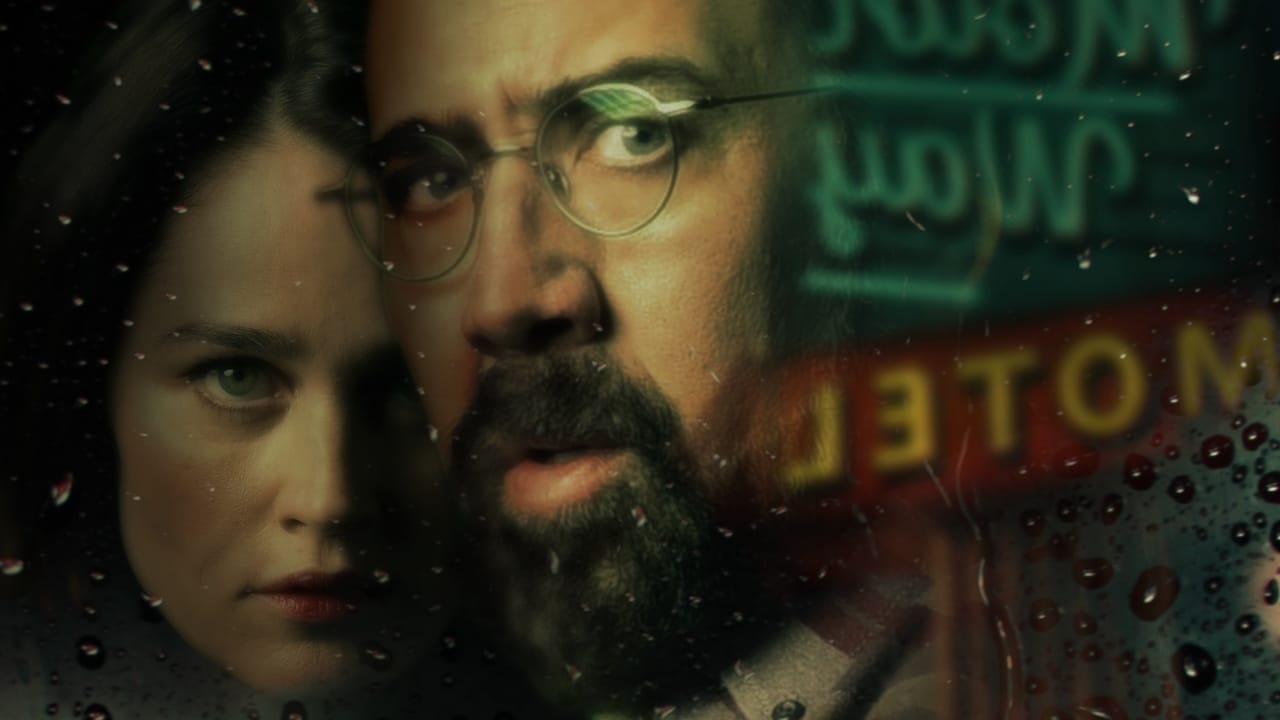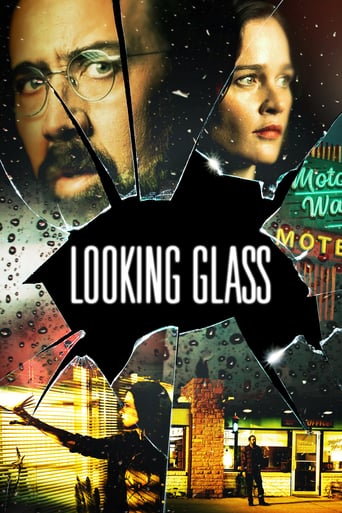

It is a performances centric movie
... View MoreDon't listen to the Hype. It's awful
... View MoreBeautiful, moving film.
... View MoreGreat movie. Not sure what people expected but I found it highly entertaining.
... View MoreIt's called Voyeur and it's a documentary on Netflix about a guy in Colorado who peeped on guests in his hotel. This movie is a blatant rip off of that story.
... View MoreIn the bonus track of the DVD of "Looking Glass," the film's producers described the eclectic mix of film styles they were trying to blend. There is indeed a bit of horror, drama, action, suspense, and dark comedy to the film. But was that stylistic mélange "knit together," in accordance with the goals of the filmmakers?One of the problems with the film was the unpleasantness of the characters. The two leads were Ray (Nicholas Cage) and Maggie (Robin Tunney). They were parents seeking to get a fresh start on life after the death of their daughter, who fell to her death due apparently to parental negligence. At the least, the parents do not command our admiration as they run away from their past and decide to purchase a motel in a "transition" town out west. And they characters they meet in their new home will be such an unsavory lot that they are sure to regret getting into the motel business.The filming was done in the small town of Kanab, Utah, a transition town on the way to the Grand Canyon. The moniker of the Motor Way motel is "Night Owls Sleep Here." But based on the strange happenings in Room #10, it should be called the Bates Motel.Room #10 includes a two-way mirror that was discovered by Ray, an electrician and good handyman. But Ray decides to make use of the mirror in voyeuristically observing the activities of the paying customers. After a murder is committed in Room #10, the film turns into a whodunnit, wherein nearly every character in the film is arguably a suspect. It up for grabs who will be pegged as the Norman Bates.It is unlikely that the town of Kanab will attract many new tourists, based on this film. While Kanab appeared to be a nice, sleepy, little town in a beautiful part of the country, the sleazy characters of "Looking Glass" will not instill confidence in travelers who want a good night's rest at the Motor Way motel.In the Book of Corinthians, the Bible tells us that "for now we see through a glass, darkly; but then face to face." (1:13:12) Unfortunately, the characters who come face to face in this film typically do not like what they see.
... View MoreOpening Scenes Preview:As LOOKING GLASS opens we see the opening titles intermixed with scenes of a less than late-model pickup truck, laden with personal belongings, making its way down a two-lane highway in the middle of wide open, scrubby desert. Ray and Maggie, played by Nicholas Cage and Robin Tunney, are obviously on their way somewhere to "start over". This is conveyed by close-up images of their strained expressions, a small collection of "traveling cross-country" sequences (stopping to pee, daytime driving, nighttime driving) and half-transparent flashback images letting us know they have suffered the tragedy of the accidental death of their toddler child.They eventually arrive at their destination, The Motorway Motel. But Ray and Maggie are not here to stay as guests; they're to be the new owners and operators. Strangely, the motel office is dark as Ray bangs on the door. Then he notices an envelope on the ground, and in it he finds the key to the door of the office. Apparently, the previous owner, Ben, has just turned out the lights, locked up, carelessly put the key in an envelope, and left. Exploring their new living quarters they find a sloppy, terse note, "She's all yours", which apparently covers everything since it appears that even all of Ben's personal belongings are still here. There's even a bit of dirty clothes lying around.Ray unloads the pickup truck and does a quick survey of The Motorway Motel. It's one of those little strip motels, rather nondescript, but the rooms appear to be neat and tidy. Like all such high-quality establishments, everything is either screwed or nailed down. Even a very crooked picture is solidly secured to the wall. Crookedly.Ray receives an odd call from Ben, who appears to be a very weatherbeaten old man. But the call is rushed and peculiar, full of obviously insincere encouragement from Ben to Ray about running their new motel. Wherever Ben is, he's clearly apprehensive about something, rushes the call, and leaves.The next morning, the motel "cleaning crew", a primarily Spanish speaking woman and her nephew, arrive and proceed to go about their business, falling just short of ignoring Ray completely in the process. They're here to do their thing, not to be friends. The Kafkaesque sensation increases.Ray and Maggie settle into their first day and start to do the never-ending collection of chores that constitute the daily routine of running a cheap motel. Fixing plumbing, hanging pictures, getting the pool ready for guests. When they can, Ray and Maggie try to inject a little fun with each other while doing their work. Ray finds a door labeled, "PRIVATE KEEP OUT PUMP ROOM" which, oddly enough, is not merely locked. It's secured with a chain and padlock, to which Ray does not seem to have a key.Ray goes to the store and picks up a few supplies, one of which is a bolt cutter for that room. Breaking in, Ray finds it's not just a pump room. There's actually several spaces within, mostly filled with a lot of junkie stuff one needs to run a low rent motel.Ray returns to his maintenance and notices that Maggie has checked in their first guest, who Ray sees closing her room curtains while half naked. Later that evening, their second guest arrives, a rather peculiar truck driver, Tommy, who insists on room 10 amongst his other collection of odd behaviors. There's a lot of pregnant pauses in the conversation between Ray and Tommy.The next day, Ray goes to the downstairs part of the "pump room" to retrieve some caulking he saw there, and notices a large framed opening in the basement wall that's been covered over by some junk cloth and a few fiberboard panels. Removing the blockage, he finds a large crawlspace. Going into it, he follows a walkway to a ladder that leads to a hidy space, a secret room on the other side of a one-way mirror that permits spying on the occupants of room 10.As it turns out, room 10 is special in a lot of ways.Review:LOOKING GLASS is a well-made movie with at least a handful of reputable actors which, as seems to happen so often in the movies I review, makes me lament how difficult it must be to achieve storylines with a degree of quality commensurate with the rest of the technical aspects of a movie. Skillful moviemakers can accomplish good music, good cinematography, satisfactory acting and etc. almost at will like turning a crank. Coming up with a story that's worth making into a movie appears to be a much more difficult problem.In order to achieve its sense of "mystery", LOOKING GLASS relies upon tedious trickery in the apparent hope you won't notice the utter lack of a finished plot line.To confuse you into thinking that there is a "mystery unfolding", most of the dialogue is deliberately stilted. This reads to your mind as if something is going on whether or not it actually is. No one ever seems to really communicate with anyone else, and what conversations occur are deliberately stilted and uncomfortable. Most of the unusual feeling one gets about the movie stems from how oddly the conversations play out, just going across your tongue wrong like desalinated water. Every single character is an "odd duck", invariably acting peculiar and subtly hostile. Conversations are sprinkled with periods of silence as the characters stare at each other without speaking. We are instinctively tuned to be uncomfortable in the presence of conversations that are awkward or make no sense. Collectively, this is just verbal spackle to cover up for the fact that what you have here is a movie with no reason for being.Here's a couple of examples:Review the conversation that Ray has with Ben in the desert. No information is actually conveyed from Ben to Ray. There is even Ben using a Geiger counter on Ray that makes no sense whatsoever and has nothing to do with anything. Ben reveals no secrets or insights to Ray that illuminates anything. It's content-less gibberish.Review the fight scene between Howard and Ray. Howard makes a comment about finally understanding how "Ben knew" what Howard had done but there is no other indication in the movie that Howard had any reason to think that Ben knew anything. But if we don't just SAY that, then we won't have any reason for Howard's behavior.And at the end of the movie, with a dead Sheriff in one of their hotel rooms with bullet wounds that have to look more like an execution than anything else, Ray and Maggie just... drive away. Yep... That'll work. Certainly makes as much sense as anything else in LOOKING GLASS.As many others have commented upon it, so must I: while perhaps not the greatest actor in the world, it somehow feels surprising to find Nicholas Cage in such a picture. I've come across two potential explanations why Cage would be involved in such a movie. Cage himself says that always working is a life choice of his and that when not keeping busy he has a tendency toward self-destruction. Others have commented that he may have as much as a $14 million debt he has to work off with the IRS and movies such as this is just what that looks like.Whatever the case, I hope he gets that debt paid off soon. For our sake as well as his.
... View MoreLooking Glass is my latest write-up. It's a murder mystery with style to burn not to mention a surprisingly restrained performance by Nicolas Cage. "Glass" echoes the works of David Lynch, Nimrod Antal, and newbie helmer, Tom Ford. I can't quite recommend it but it does give you reason for avoiding residence at a seedy motel. "Glass", with its stirring score by Mark Adler, its blase, villainous turn by Marc Blucas, and its Shining-style cinematography by Patrick Cady, revolves around a dude named Ray (Cage). Ray drinks, smokes, looks like a nervous Nellie, and becomes relentlessly curious throughout the entire, 104-minute film.Ray loses his daughter in a devastating accident. He then takes his drug addict wife (Maggie played by Robin Tunney) and moves to a rundown lodge somewhere in desolate California. There, he becomes the sole owner. Said lodge is plagued by prostitution sex, lesbian encounters, and cold-blooded liquidation (involving pigs and humans no less). Ray observes a lot through a mirror in room ten (hence the title of Looking Glass). The whole pic is set against Grindhouse-style opening credits, Hitchockian residue, and fading, in-and-out characters. Director Tim Hunter (1986's River's Edge) may be a seasoned veteran but he shoots "Glass" with too much enigma. He toys with his audience while deeming his flick as something where every single persona messes with Cage's Ray for no penetrable reason. His direction seems admirable and the performances are on par. However, Hunter's premise for the majority of the way, meanders. It never fully adds up until the audience has had enough of the pic's manipulative guessing game. Bottom line: Looking Glass may be striving for introspect and pungent, U Turn navel-gazing. Nevertheless, it "looks" like just another genre exercise in cactus desertion. Rating: 2 and a half stars.
... View More